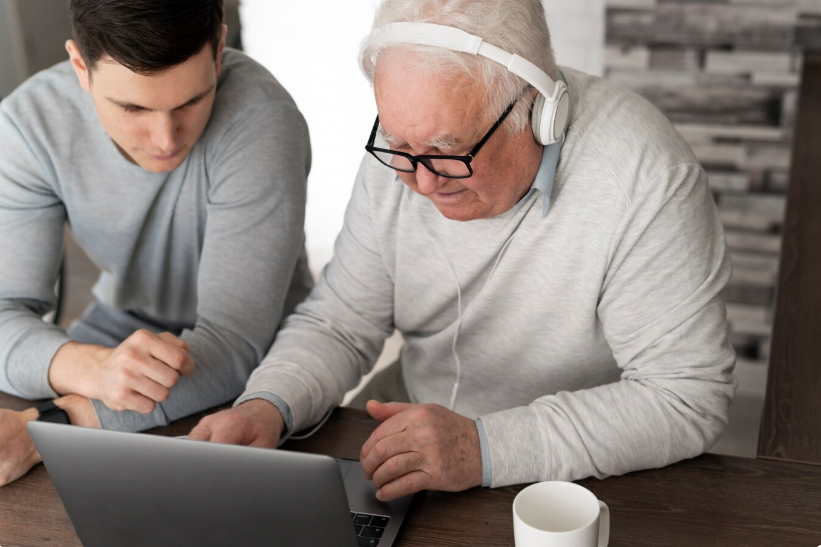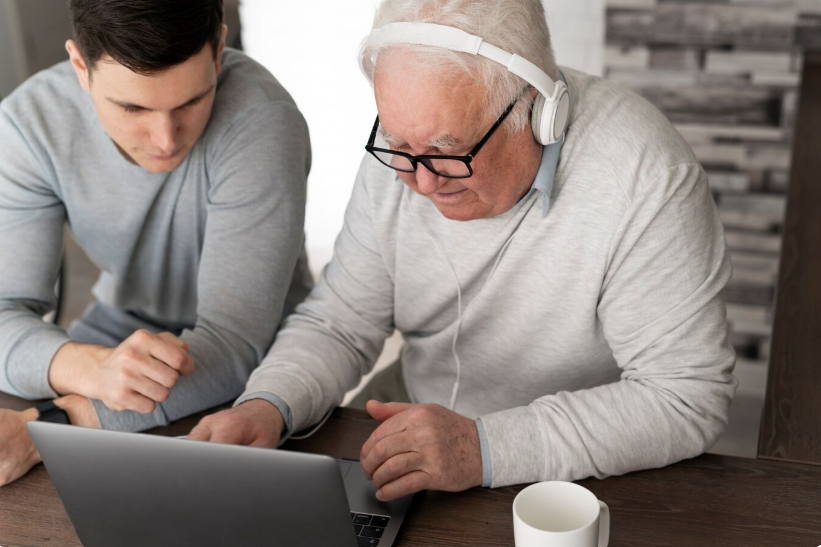
Mental health can happen at every stage of life as you cope with the loss of family or friends, deal with loneliness, or simply feel overwhelmed, tending to worsen for older adults who need to find support, guidance, and more connection.
Licensed therapists, supportive communities, wellness apps, and other trustworthy resources can help to cope with health issues, provided you know where to begin, given the numerous services available, especially as a newbie to technology.
That’s why we created this guide with clear and user-friendly explanations of the best online mental health resources, how they work, how to stay safe, and how to choose the right ones for you or a loved one. We hope you will find it helpful.
Why Mental Health Support Matters for Older Adults?
Emotional well-being becomes more crucial as we experience life changes, such as retirement, health concerns, loss of loved ones, and related concerns. These mental health challenges often go unnoticed in older adults, leading to severe consequences for many.
According to the World Health Organization, around 5% of adults suffer from a mental disorder, most commonly depression and anxiety. Still, many don’t seek help, which can grow over time, unless openly discussed.
The common mental health challenges in later life include:
- Loneliness and isolation lead to a deep sense of disconnection.
- Grief and loss caused by the passing of a spouse, friend, or sibling typically leave lasting emotional pain.
- Anxiety and depression due to changes in routine, mobility, or independence.
- Cognitive decline or memory loss can cause fear, frustration, and even early signs of depression.
- Caregiver stress occurs as many seniors care for a spouse or adult child, which can cause emotional burden.
Helpful tip: Talk to a mental health professional or connect with a supportive online community instead of going through these challenges alone.
Online Mental Health Tools.
Top online mental health tools enable many, including seniors, to access emotional support. For example, you can chat with a licensed therapist, join a grief support group, or listen to calming audio before bed.
The use of online mental health tools accelerated during the COVID-19 pandemic, when many in-person services shut down. Older adults turned to telehealth platforms, mental wellness apps, and virtual communities to stay connected and supported, and millions now use this trusted option.
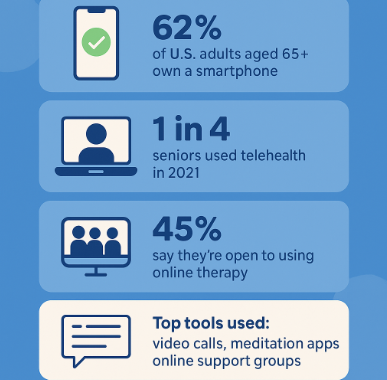
Why Online Tools Work Well for Seniors?
- Enable you to talk to someone from the comfort of your home, without traveling.
- Many services offer phone sessions, extensive print options, or step-by-step setup help.
- Most legitimate platforms connect you with real therapists or trained support staff.
- Moderated forums allow for sharing experiences with others facing similar life stages.
Some of the trusted platforms include:
| Platform | Type | Note |
| BetterHelp | Online Therapy | Offers licensed therapists; flexible scheduling |
| Talkspace | Online Therapy | Covered by some Medicare Advantage plans |
| Calm | Meditation App | Great for sleep, anxiety, and breathing exercises |
| AARP Community | Online Support Forum | Senior-specific peer conversations and support |
| HelpGuide | Mental Health Articles | Nonprofit site with senior-friendly advice and education |
Types of Online Mental Health Resources.
The most common online mental health resources enabling older adults to access professional support to fit their needs include:
Online Therapy Services (Teletherapy).
Teletherapy services can connect you with licensed professionals through secure video or phone sessions privately and conveniently, making them ideal if you find travelling or in-person visits difficult.
The process is straightforward:
- Sign up on a platform like BetterHelp or Talkspace.
- Fill out a short questionnaire about your needs.
- Contact a matched therapist by messaging, phone, or video options.
You don’t need to commute or wait in rooms as you attend sessions from the comfort of your home, while benefiting from flexible pricing and scheduling.
Related Content: How Can Smartwatches Measure Blood Pressure?
Online Support Groups for Seniors.
Support groups allow older adults to share experiences and find encouragement from others with similar challenges, such as grief, caregiving stress, or chronic illness.
For example, you can join AARP Online Community, GriefShare, or AgingCare Forums to discuss topics such as loneliness and isolation, loss of a spouse or friend, coping with memory issues, stress from caregiving duties, and more.
Health and Wellness Apps.
Mobile or tablet apps offer simple tools to help with anxiety, sleep, stress, and mindfulness. Many also include voice guidance, large text, and soothing sounds ideal for seniors.
For example, you can choose the following easy-to-use apps:
- Calm for guided meditations, sleep stories, and breathing exercises.
- Headspace to manage daily stress relief, gentle yoga, and relaxation.
- MindShift CBT to help cope with anxiety.
Tips: Choose apps featuring senior-friendly interfaces with adjustable font sizes and voice support options, and free versions to try before committing.
Educational Mental Health Websites.
Reliable websites provide valuable information to understand your symptoms, treatment options, or how to support a loved one.
Some trusted sources include:
- HelpGuide.org is a nonprofit site that provides mental health advice.
- NIMH for science-based information on depression, anxiety, and treatment.
- Mayo Clinic covers psychological and physical health topics in plain language.
Tip: Stick with .gov, .edu, or well-known nonprofit organizations instead of websites that promise instant cures or lack transparency about who runs them.
| Type of Resource | What It Offers | Examples | Best For |
| Online Therapy | Private video or phone sessions with licensed professionals | BetterHelp, Talkspace | Seniors who want one-on-one, professional help. |
| Online Therapy | Peer connection, emotional sharing, and community support | AARP Forums, GriefShare, AgingCare | Those coping with grief, isolation, and caregiving. |
| Mental Health Apps | Tools for stress relief, sleep, mindfulness, and anxiety management | Calm, Headspace, MindShift CBT | Seniors want one-on-one, professional help. |
| Educational Websites | Reliable health info written in plain language | HelpGuide, NIMH, Mayo Clinic | Learning more about symptoms & treatments. |
How to Choose Reliable Online Mental Health Resources?
Older adults need to know trustworthy online platforms, apps, and websites offering mental health support, given the numerous options available. Let’s guide you through the key things to look for.
Check for Professional Credentials.
Check if the platform lists the qualifications of its therapists or counselors.
- Licensed mental health professionals (LPC, LCSW, LMFT, PsyD, etc.)
- State board certifications.
- Verified reviews or testimonials.
Review Privacy and Security Policies.
Always check how the platform handles your personal information.
- Look for the padlock in the browser to see if the website uses HTTPS.
- Offer clear privacy policies.
- Can’t share your data without consent.
Pro Tip: Avoid platforms that ask for sensitive health information before you register or without telling you how it will use it.
Pricing and Subscription Options.
Many therapy apps and platforms offer different tiers, such as free trials, sliding scale pricing for seniors or low-income users, and Medicare Advantage coverage for some services.
Ask whether the platforms:
- Have hidden fees.
- Offer easy membership or subscription cancellation.
- Provide live support regarding billing questions.
Senior-Friendly Design.
It is also essential to check if the site or app you want to join features large fonts, simple layouts, and if it is accessible on tablets and smartphones.
Other essential checks include being able to adjust contrast or volume, tech support, or onboarding sessions.
Users’ Reviews and Recommendations.
Read independent reviews rather than testimonials on their site before signing up, and ask a trusted healthcare provider, senior center, or caregiver about trustworthiness.
Or visit trusted forums, such as AgingCare for caregivers, to see what other users say about the platform, site, or app, and decide if it is worth it.
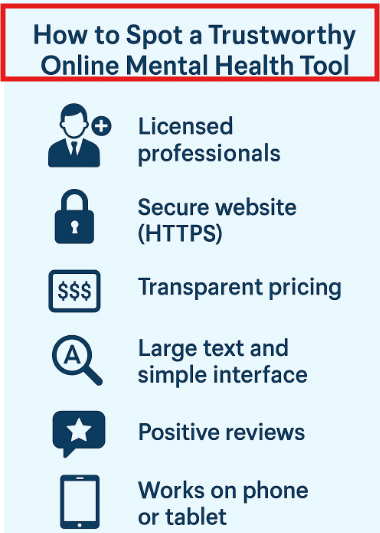
Top Technology Tips for Seniors.
The following practical tips empower you to benefit from technology without being tech-savvy.
Essential Tools.
- A smartphone, tablet, or computer with internet access.
- Chrome, Safari, or Edge web browser.
- An email address for account creation and notifications.
- A quiet, private space for therapy or meditation sessions.
Step-by-Step Setup Tips.
- Download trusted apps from trusted sources such as the App Store for iPhone/iPad, or Google Play for Android.
- Avoid apps from pop-ups or unknown websites and use large font settings and accessibility options.
- Check that the video and audio work before the therapy session.
- Use a small notebook to store usernames and passwords, or a secure password manager.
- Ask for help from a family member, a tech-savvy friend, or a senior center that can walk you through the setup if needed.
Privacy and Security When Using Online Health Tools.
Always understand how to stay safe, avoid scams, and protect your digital well-being when using therapy platforms, apps, or even support forums, which require sharing personal or sensitive information.
For example, secure online health tools can ask for your name, age, health concerns, or payment information, while some other sites can be scams to steal your sensitive data.
How to Check Secure Websites?
Check these signs before entering your private information:
- “https://” at the beginning of the website address, the “s” means secure.
- Padlock icon 🔒 in your browser’s address bar.
- Avoid sites with lots of pop-ups, typos, or urgent messages.
- Never share your banking or Social Security information on an untrusted website.
Watch Out for Scams and Fake Apps.
Some websites or apps pretend to be mental health tools while intending to collect your data or money.
Still, you can avoid them with the following tips:
- Only download apps from the Apple App Store or Google Play.
- Avoid emails or ads promising “instant healing” or asking for payment upfront.
- Don’t click on unfamiliar links sent by text or email.
- Ask a family member or caregiver to help verify a site if you’re unable to do so.
Related Content: Online Safety Tips Every Senior Should Know.
Best Online Safety Practices.
- Use strong passwords, which don’t include your names or birthdates.
- Log out after using mental health platforms, especially on shared devices.
- Use a secure home Wi-Fi network or mobile data connection, instead of public connections in cafes or airports for private sessions.
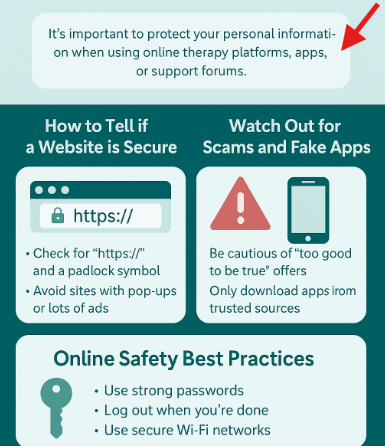
Talking to Someone Offline.
Online mental health tools may not fit all individuals, despite their potential benefits. Some seniors feel more comfortable speaking to someone face-to-face or over the phone for better emotional health.
That’s why we also explore offline mental health resources for older adults, including national helplines, local support centers, and hybrid care options.
Trained Professional by Phone.
Several national helplines offer free, confidential conversations with trained counselors or volunteers. You can, for example, use the following trusted phone hotlines as a senior.
| Service | Phone Number | Offerings |
| 988 Suicide & Crisis Lifeline | 988 | 24/7 emotional support for anyone in distress |
| SAMHSA Helpline | 1-800-662-HELP (4357) | Substance use and mental health support |
| Friendship Line (for seniors) | 1-800-971-0016 | Crisis intervention and a caring voice for older adults |
| Alzheimer’s Association Helpline | 1-800-272-3900 | 24/7 support for caregivers and individuals with dementia |
Local In-Person Support.
You can also find local mental health services through your primary care doctor, community health centers, senior centers, churches, or area agencies on aging.
These providers offer in-person and telehealth appointment options to choose what suits you the best.
Online and Offline Support Hybrid Care.
You can also use online and offline support hybrid care options as follows:
- Weekly in-person support group and daily calmness or meditation app.
- Occasional video therapy and regular check-ins with a trusted pastor or friend.
- Reading articles online while also attending a caregiver workshop nearby.
Whether you choose to go digital, stick to offline help, or use both, what matters most is getting the necessary support to overcome the mental health issues.
Related Article: How to Use Telemedicine Services Effectively for Seniors?
Frequently Asked Questions (FAQ).
Mental health tools can overwhelm you if you are unfamiliar with online services. This section addresses the most common concerns you or your caregivers may have about virtual mental health support.
Is online therapy safe for seniors?
Online therapy is safe and secure, provided you use a reputable platform. Look for services that use encryption, clearly list therapist credentials, and comply with privacy laws like HIPAA (in the U.S.).
Some of the most trusted platforms include BetterHelp, Talkspace, or you can ask for recommendations for your healthcare provider.
Can Medicare cover online therapy?
Original Medicare typically doesn’t cover online therapy, but many Medicare Advantage plans (Part C) now include telehealth services, including mental health. Always check with your insurance provider as coverage may vary.
What are the best mental health apps for seniors?
Some of the most senior-friendly apps include Calm for sleep, stress, and mindfulness, Headspace for daily guided meditations, and MindShift CBT for managing anxiety.
Look for apps with large fonts, voice options, simple navigation, or other essential features you feel comfortable with.
Are online support groups helpful for grief or loneliness?
Older adults typically find comfort and connection through online support groups or forums, enabling them to share experiences, ask questions, and receive encouragement from others who understand.
The most trusted include GriefShare, AgingCare Forums, and AARP Online Community; join what suits you best.
What if I am uncomfortable using the internet?
Look for offline options, such as 988 Suicide & Crisis Lifeline, Friendship Line for seniors, your local senior center, or a church.
You can also ask a trusted family member to help set up a safe, simple online tool, or read aloud from educational websites, such as HelpGuide.org.
Final Thoughts on Taking the First Step.
Online mental health tools can help if you have grief, anxiety, loneliness, or simply seek a sense of peace, but you still need to choose a safe and secure platform to avoid being scammed.
Join online support groups, try a mindfulness app, book a free consultation with a licensed therapist, or simply call a helpline to talk to someone and improve your emotional strength and well-being.

